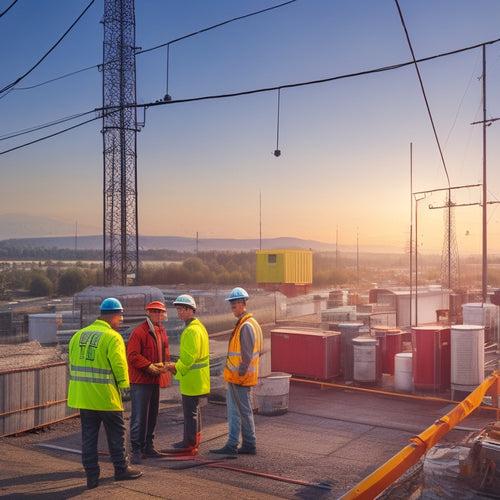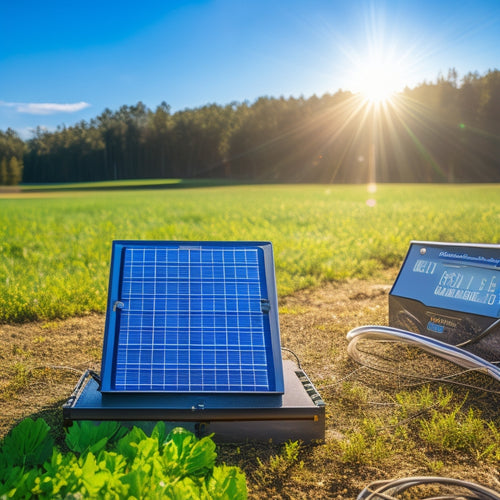
Home Electricity Backup System
Share
You invest in a home electricity backup system to guarantee uninterrupted power supply during grid failures, keeping your lights, refrigerator, and critical systems running smoothly. This automatic switch provides reliable power, preventing food spoilage and maintaining safety. You can also integrate solar power and generators for extended outages. By understanding your energy demands and evaluating your daily power requirements, you can prioritize power management and reduce your reliance on the grid. With advanced battery technology and seamless power changes, you'll enjoy peace of mind and energy independence - and there's more to investigate about how a backup system can benefit your home.
The Essentials
- Home electricity backup systems provide automatic switch to emergency energy supply during grid failures, ensuring operational lights, refrigeration, and critical systems.
- Backup systems protect against blackouts, preventing food spoilage, electronics damage, and costly losses, while promoting sustainability through solar power integration.
- Installing a backup system increases property value and resale potential, making homes more attractive to buyers who seek energy independence and reliability.
- Automatic Transfer Switch (ATS) operation ensures seamless changeover between power sources, detecting grid power failure and signaling backup generator start in seconds to minutes.
- Assessing energy demands is crucial for selecting a backup system, involving calculation of daily power requirements, identification of essential appliances, and prioritization of power management.
Reliable Power During Outages
You need a reliable power source to protect your home from the inconvenience and potential danger of power outages.
A home electricity backup system provides power outage protection by automatically switching to an emergency energy supply when the grid fails. This guarantees that your lights, refrigeration, and critical systems remain operational, keeping you and your family safe and comfortable until the grid is restored.
Power Outage Protection
A blackout can strike at any moment, leaving you in the dark and disrupting your daily routine. With a home electricity backup system, you can guarantee that you're protected from power outages and their consequences. This system is designed to provide you with reliable power during outages, giving you the freedom to live life on your own terms.
In addition, a reliable battery backup for home prevents food spoilage and maintains safety, assuring that your household remains secure and comfortable. The system's power outage protection feature guarantees that your home remains powered even when the grid goes down. This is achieved through solar integration, which allows you to utilize the power of the sun to generate electricity.
Additionally, the system's generator compatibility feature enables seamless integration with a generator, providing a secondary source of power during extended outages.
With a home electricity backup system, you can rest assured that your home will remain powered, even during the most unpredictable weather conditions. This means you can keep your refrigerator running, your lights on, and your communication devices charged, guaranteeing that you stay connected and informed.
Emergency Energy Supply
During power outages, a dependable emergency energy supply is fundamental to maintaining a sense of normalcy in your daily life. You need a backup system that can provide consistent power to your home, guaranteeing your family's safety and comfort.
A well-designed emergency energy supply system can seamlessly take over when the grid fails, giving you peace of mind. With a Home Battery Backup system, you can prevent costly losses due to food spoilage and damage to electronics by keeping your refrigerator and other essential appliances running during outages Backup Power Solutions.
Furthermore, you can guarantee continuous power supply for significant systems like medical equipment, security systems, and HVAC units, making it an indispensable solution for households with specific needs.
When designing your emergency energy supply system, consider integrating solar power to reduce your reliance on fossil fuels. Solar integration can provide a clean and sustainable source of energy, especially during extended outages.
Additionally, investing in a high-quality generator is imperative. Regular generator maintenance is crucial to guarantee it runs efficiently and effectively when you need it most. This includes routine checks, oil changes, and filter replacements.
Increased Property Value
By installing a home electricity backup system, you're not only ensuring reliable power during outages but also improving your property's real estate appeal.
With the rise of residential battery backup solutions, homeowners are increasingly looking for properties that come equipped with backup power systems.
This added feature can greatly enhance your home's resale potential, making it more attractive to potential buyers.
As a result, you can expect a higher return on investment when it's time to sell your property.
Enhanced Real Estate Appeal
How much more attractive would your home be to potential buyers if it came equipped with a reliable backup power system? A home electricity backup system is a significant selling point, offering energy independence and peace of mind to homeowners.
It's a feature that sets your property apart from others on the market, making it more desirable to those seeking a secure and modern living space.
In today's world, home automation is no longer a luxury, but a necessity. A backup power system seamlessly integrates with your existing home automation infrastructure, ensuring that your smart home devices and appliances remain functional during power outages.
This level of convenience and reliability is highly appealing to potential buyers, particularly those who value freedom from utility grid disruptions.
Boosted Resale Potential
Your property's resale value receives a significant enhancement with the installation of a home electricity backup system, as it becomes a highly sought-after feature in today's real estate market.
You'll be pleased to know that this upgrade can lead to a substantial increase in your property's market value. In fact, studies have shown that homes equipped with backup power systems can command a 3-5% premium over similar properties without this feature.
As you consider installing a home electricity backup system, keep in mind that you're not only ensuring energy independence for yourself, but also making a savvy investment in your property's future resale value.
Current market trends indicate that homebuyers are willing to pay a premium for properties that offer this level of security and reliability. By installing a backup power system, you're positioning your property to stand out in a competitive market and appeal to discerning buyers who value energy independence.
Automatic Transfer Switch Operation
You'll want to understand how your automatic transfer switch (ATS) operates to guarantee a seamless changeover between your primary and backup power sources.
The ATS has different modes, such as automatic, manual, and non-automatic, which determine how it responds to power outages. For instance, with a reliable emergency power solution like solar power backup systems, you can rest assured that your home will stay powered during outages.
You'll also need to take into account the switching time delays, which affect how quickly your backup system kicks in and how long it takes to transfer power back to the grid once the outage is resolved.
Transfer Switch Modes
Three primary transfer switch modes govern the automatic operation of a home electricity backup system: automatic, manual, and non-automatic.
You'll want to understand the differences between these modes to guarantee your system operates safely and efficiently.
In automatic mode, the transfer switch seamlessly switches between grid power and backup power when an outage occurs. This mode is ideal for homes with critical appliances that require continuous power.
Manual transfer mode, on the other hand, requires you to manually switch between power sources. This mode is typically used in smaller backup systems or when you want more control over the switching process.
Non-automatic mode is used in applications where the transfer switch isn't designed to switch automatically, and you'll need to intervene to switch between power sources.
When selecting a transfer switch type, consider factors like switch installation, safety regulations, and switch load management to guarantee a reliable and efficient backup system.
Switching Time Delays
What happens when the grid power fails, and your home electricity backup system kicks in? The switching time delay is a vital aspect of your automatic transfer switch (ATS) operation. When the grid power fails, your ATS detects the outage and sends a signal to start your backup generator. However, there's a brief delay between the grid failure and the generator taking over. This delay can range from a few seconds to several minutes, depending on the system's configuration and the type of generator.
Effective delay management is essential for minimizing disruptions to your daily life. A well-designed ATS guarantees a seamless shift between grid power and backup power, maintaining switching efficiency.
You can configure your ATS to prioritize specific loads, making sure important appliances like refrigerators and medical equipment receive power first. By optimizing switching time delays, you can reduce the risk of equipment damage, data loss, and inconvenience.
A reliable home electricity backup system with efficient delay management secures your freedom from grid outages and provides uninterrupted power supply.
Assess Your Energy Demands
You'll need to understand your energy consumption patterns to determine the right backup system for your home.
Start by identifying your daily power requirements, including the types of appliances and devices you use, their wattage, and how often they're used.
When considering your energy demands, it's also essential to think about the reliability of your energy source, such as solar battery systems, and how it can impact your overall energy independence.
Energy Consumption Patterns
Understanding your energy consumption patterns is essential in determining the right size and type of home electricity backup system for your needs. You need to identify your energy usage habits, including the times of day when you consume the most energy, to guarantee your backup system can meet your power demands.
Start by examining your past utility bills to identify consumption trends. Look for patterns, such as peak usage during summer afternoons when your air conditioner is running or during winter mornings when you're using electric heaters.
Consider your energy efficiency strategies, like using LED bulbs or energy-efficient appliances, which can reduce your overall energy consumption. You should also consider the type of appliances you use, such as refrigerators, ovens, and washing machines, as they've varying power requirements.
Daily Power Requirements
Having identified your energy consumption patterns, you're now ready to evaluate your daily power requirements. This step is vital in determining the right backup system for your home. To do this, you'll need to calculate your total daily energy usage in watt-hours (Wh).
Start by listing all the essential appliances and devices you want to power during an outage, including lights, refrigerators, and medical equipment. Next, note their individual power ratings in watts (W) and the number of hours you expect to use them daily. Multiply these values to get the daily energy requirement in Wh. Add up the Wh for all devices to get your total daily power requirement.
For energy efficiency, prioritize power management by identifying opportunities to reduce your energy demands. Consider replacing inefficient appliances with energy-efficient alternatives or adjusting your usage habits. This won't only reduce your backup system's size and cost but also minimize your reliance on the grid.
Longer Battery Life Guaranteed
You're looking for a home electricity backup system that provides reliable power when you need it most.
That's why you'll want a system equipped with powerful battery technology that's designed to maximize energy storage and minimize energy waste.
Powerful Battery Technology
Within the heart of your home electricity backup system lies a critical component: powerful battery technology. This technology is the backbone of your system, ensuring you have a reliable source of energy when you need it most.
You'll enjoy longer battery life, guaranteed, thanks to advanced battery efficiency that maximizes energy storage and minimizes waste.
When integrating renewable energy sources, such as solar or wind power, into your system, you'll appreciate the seamless shift between grid power and your backup system. This integration is made possible by advanced battery technology that can smoothly switch between different energy sources, ensuring your home remains powered without interruption.
With powerful battery technology, you'll have the freedom to live life on your own terms, without worrying about power outages or energy shortages.
You'll be able to power your home, your way, whenever you need to. This state-of-the-art technology is designed to provide you with the independence and flexibility you desire, giving you peace of mind and a sense of security.
Frequently Asked Questions
Can I Install a Home Electricity Backup System Myself?
You can attempt a DIY installation, but be aware that safety considerations are vital; improper setup can lead to electrical shock, fire hazards, or system failure, so it's essential to weigh your knowledge against the risks before proceeding.
How Long Does It Take to Install a Backup System?
When planning the installation, you'll want to know the timeline. Typically, the installation process takes around 1-3 days, depending on the complexity of the system and your electrical setup, giving you the freedom to enjoy uninterrupted power soon.
Can I Use a Backup System With My Existing Electrical Panel?
Savvy seekers of security, you're wise to wonder: can you connect a backup system to your existing electrical panel? Fortunately, yes, but consider cost considerations and power capacity to guarantee seamless integration, avoiding potential pitfalls and pricey retrofits.
Are Home Electricity Backup Systems Environmentally Friendly?
You're probably wondering if your energy independence comes at the cost of the planet's well-being. Fortunately, you can rest easy: most backup systems employ sustainable energy sources, minimizing their sustainability impact and promoting a greener future.
Do Backup Systems Require Regular Maintenance Checks?
As you traverse the intricate terrain of backup power, you'll find that regular maintenance checks are essential to extending battery lifespan; neglecting them can lead to premature degradation, but with frequent checks, you'll be enabled to maximize performance and reliability.
Final Thoughts
As you weigh your options for a home electricity backup system, ask yourself: can you really afford to be without power when the grid goes down? With a reliable backup system, you'll enjoy uninterrupted electricity, increased property value, and the peace of mind that comes with automatic transfer switch operation. By evaluating your energy demands and choosing a system that guarantees longer battery life, you'll be prepared for anything. So, what's holding you back from taking control of your power?
Related Posts
-

Is This the Future of Alternative Energy Systems
Yes, alternative energy systems are shaping the future of energy. Innovations in solar and wind technologies are driv...
-

Smart Grid Technology Implementation Challenges
You'll encounter several challenges when implementing smart grid technology, particularly in cost management, scalabi...
-

Choosing the Right Solar Power Charge Controller
Choosing the right solar power charge controller is crucial for maximizing energy efficiency and extending battery li...


